Diani Beach, with its wide stretch of sand and its reef just offshore, has long been a destination for holidaymakers and divers. But what it lacked was infrastructure for a different kind of traveler: the digital nomad, the slow worker, the person seeking connection rather than just escape. For years, Kenya was absent from the global map of remote work not because of its beauty or culture, but because of unreliable Wi-Fi, unstable power, and the lack of intentional spaces built for people who wanted to live and work here. Skippers changed that. By creating Kenya’s first true coliving and coworking space, it dramatically lowered the barriers for remote workers to consider Diani—or Kenya at all—as a place to spend weeks or months, rather than just a few days on holiday.
The project was founded by Duncan and Camilla, who previously spent years as nomadic sailors. Their background gave them both the resilience and creativity to build something new, and Camilla’s Kenyan roots meant Diani was not just a convenient backdrop, but a place with personal resonance. Together, they transformed the idea of coliving into something uniquely Kenyan: container-built rooms, powered by solar, held within a community space that now welcomes remote workers from all over the world.
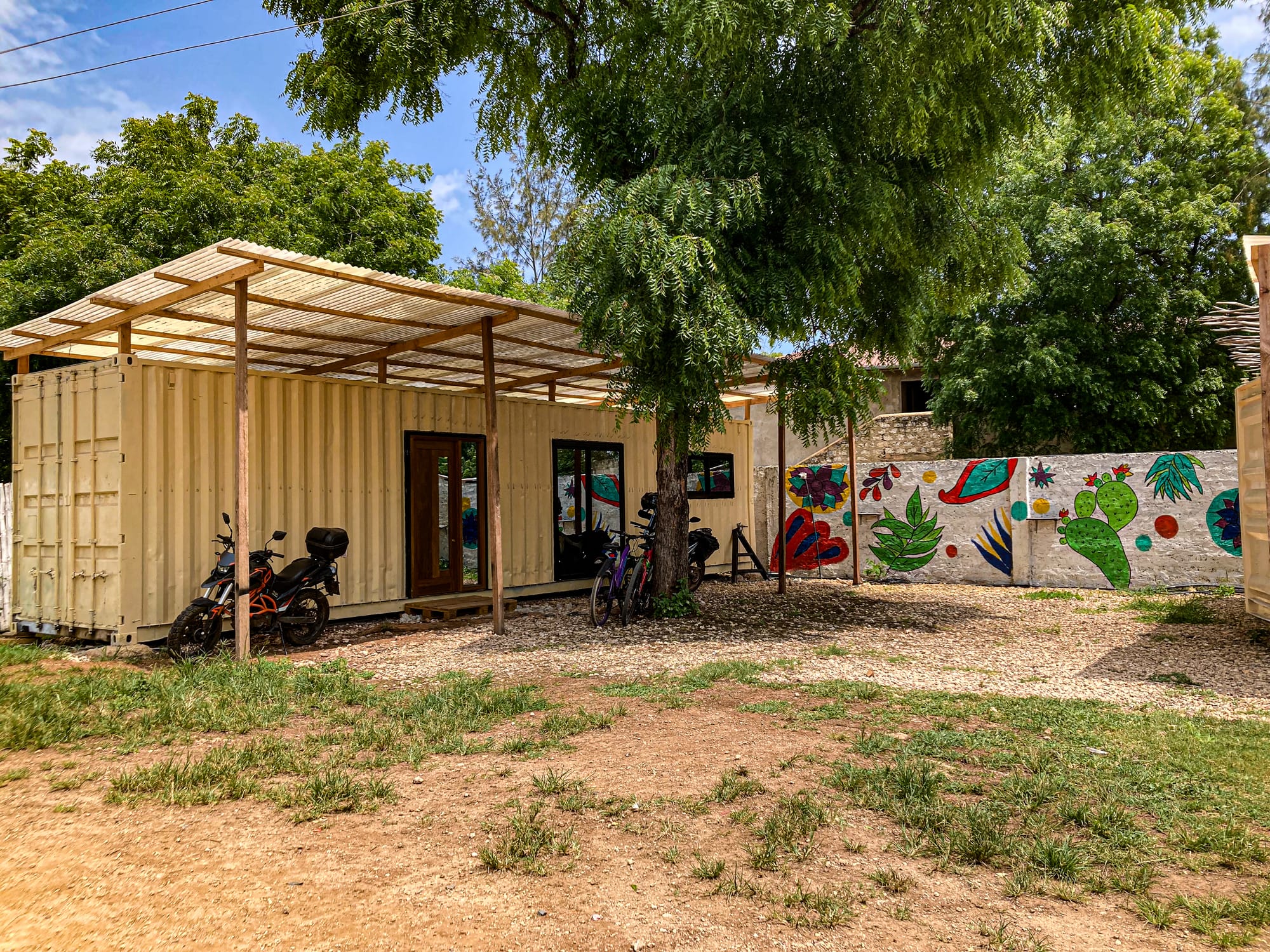
Skippers is the reason that Kenya is now on the remote work map, and we are personally really thankful for all the effort that went into making it happen and sustaining it, as it is what brought us to the beautiful country of Kenya.
A purpose-driven coliving
More than just a business project, Skippers was started with an ambitious purpose.
"We want to improve the travel experience for international nomads, adventurers, long-stay travelers and domestic remote workers with a network of vibrant communities starting in East Africa and beyond. We’ll do this while also giving back and integrating with local communities to help improve digital skills and empower the next generation."
The quote above is taken directly from their website. What they've already accomplished is absolutely no small feat, particularly when it comes to the challenges of setting up a project like this in remote and coastal Kenya.
Alongside this, their values underpin the approach they've taken to setting up and operating Skippers. Among these, they emphasize respect for the local community and its customs, environmental responsibility, and facilitation of learning opportunities for both residents and Kenyan locals.
Their statement on their ambition to have a positive impact on the local community speaks to the awareness and intention they have brought to Skippers.
It’s no secret that digital nomads get a rough time from anti-nomad protests in Portugal to graffiti in Mexico. Digital nomads are not always welcome in communities.
We believe that it is possible to make a positive impact in the communities in which we operate. We are planning:
Careers talks: We are working to integrate with schools so that we are able to give careers talks to help local teenagers broaden their horizons and understand new digital work options that they might not have previously considered.
Coaching & Training: We are hoping to develop digital talent within Skippers through programs supported by online learning, our team’s expertise, and input from willing digital nomads.
We have no doubt that as we progress through this journey we will find other opportunities to add value. Beyond this wherever we are we want to try and help our communities rather than detract. We may not always succeed and we will definitely make mistakes as we go along but this is the goal.
It's genuinely refreshing to see a coliving that takes seriously its impact on the local community.
Rooms and amenities
The shipping container rooms at Skippers are simple and functional, whitewashed and bright, accented with bamboo wardrobes and patterned textiles. They are designed to be restful without being distracting, comfortable without excess. For many remote workers, this balance matters: the room is not the point, but the backdrop for everything else.
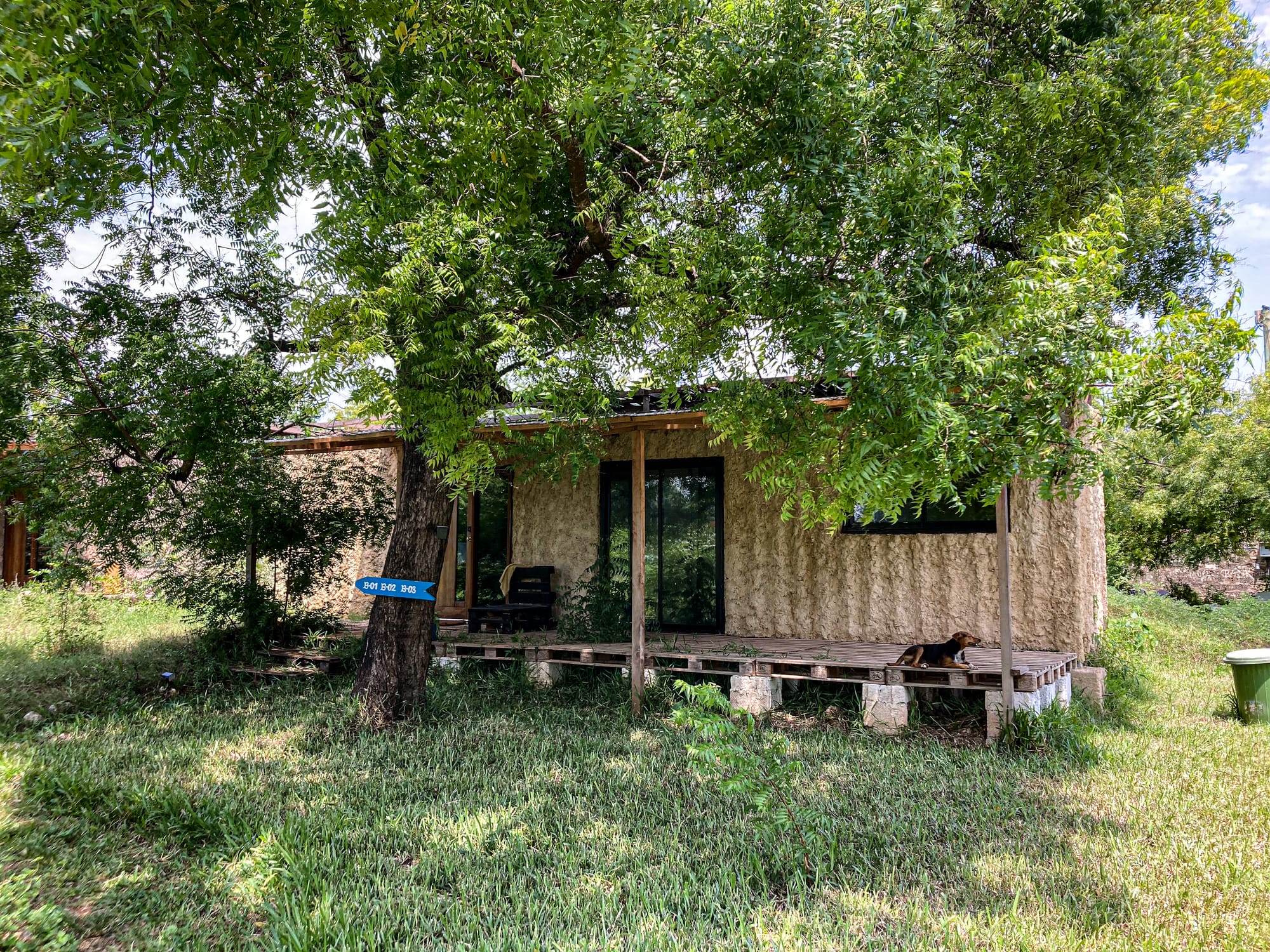
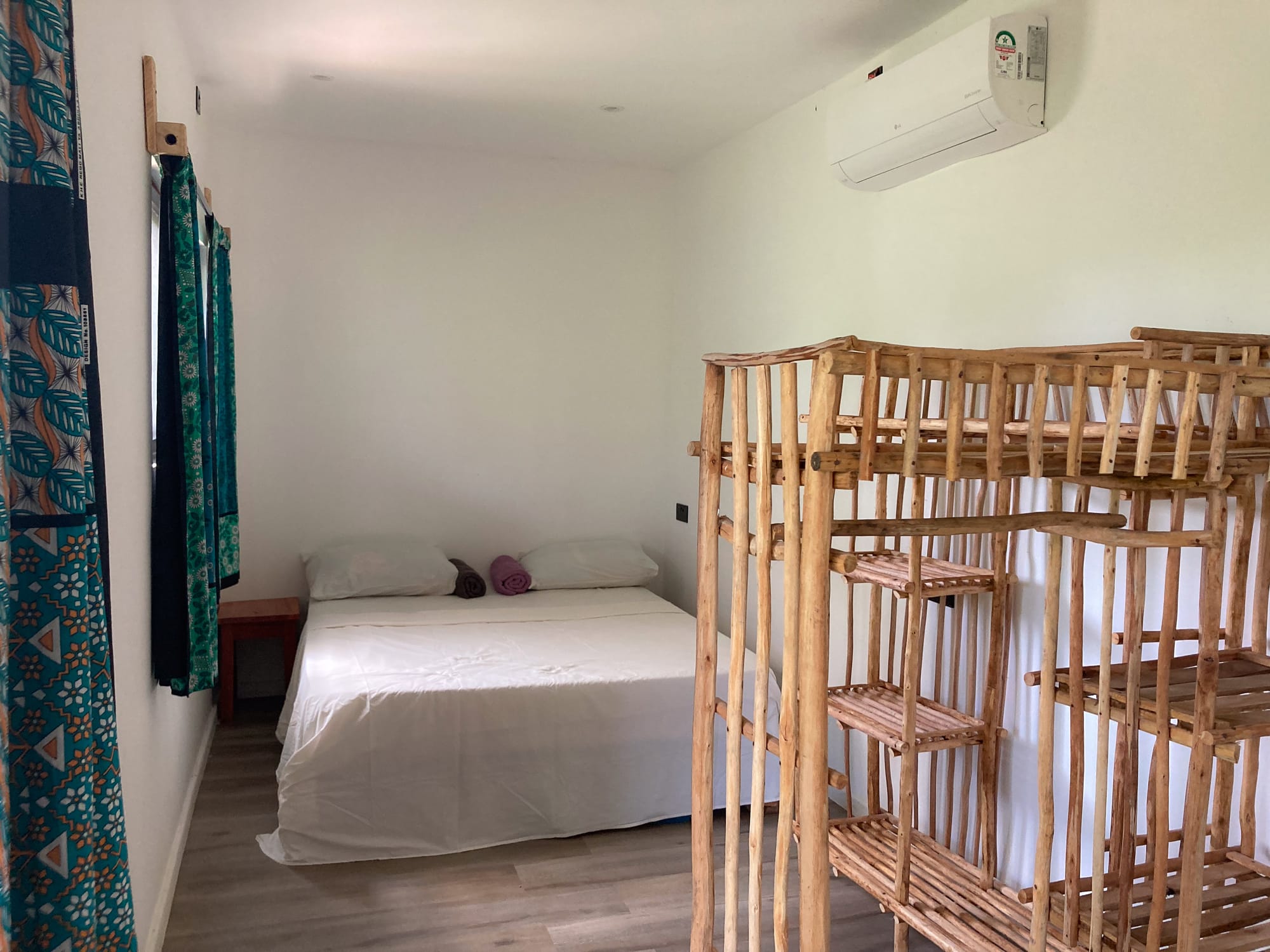
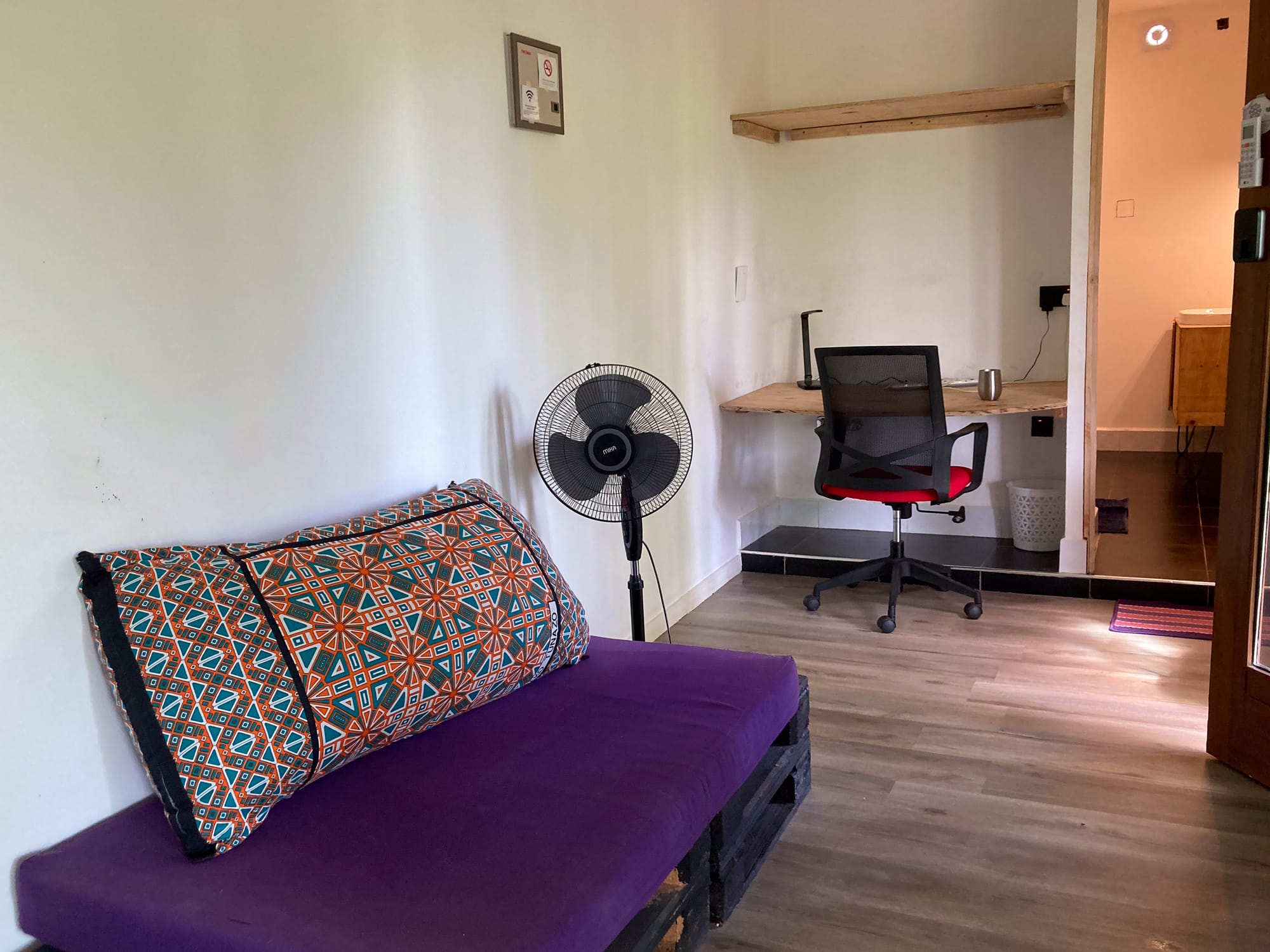
Inside one of the container-style rooms at Skippers Coliving
What makes Skippers stand apart is how well it supports the rhythms of modern nomadic life. Wifi is strong, thanks to Starlink, and backed up by additional lines so that even in the event of outages, connectivity remains steady.
Solar panels and batteries provide most of the power, with a generator standing by to fill the gaps. For those who have struggled with unreliable electricity or patchy internet elsewhere on the continent, this level of infrastructure is nothing short of transformative. It means work can continue uninterrupted, and it means people who might never have considered Kenya as a remote work destination are now coming here because of Skippers.
The onsite restaurant, House of Woodfired, is famous for its pizzas, but also serves poke bowls where you can pick what you'd like included. They've got tofu and mushrooms as vegan options. Guests can additionally order meal plans that allow food to be prepped in advance and stored until needed, removing the stress of cooking while working to deadlines. It is the kind of detail that seems small until you realize how much it shapes the ease of daily life.
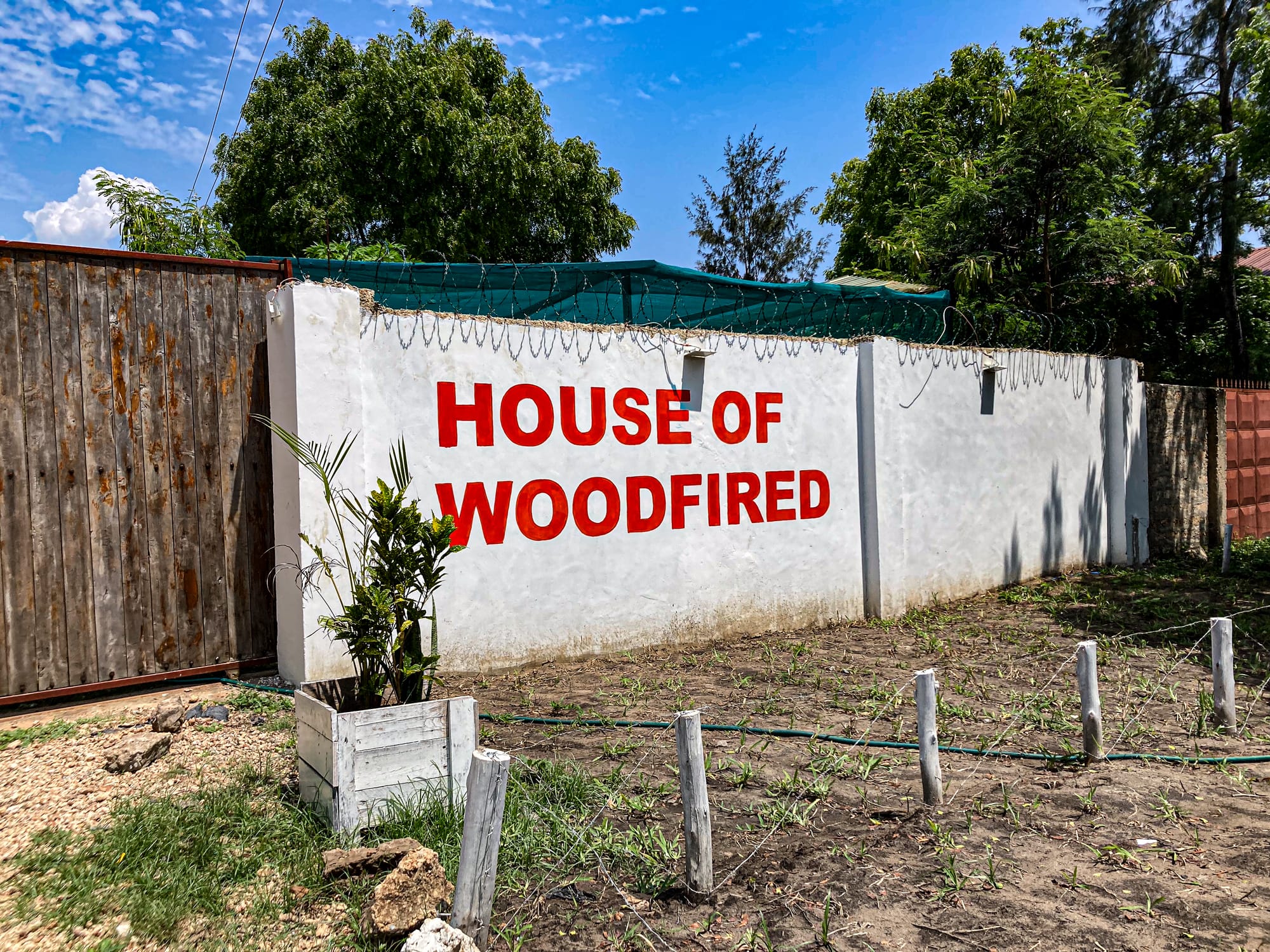
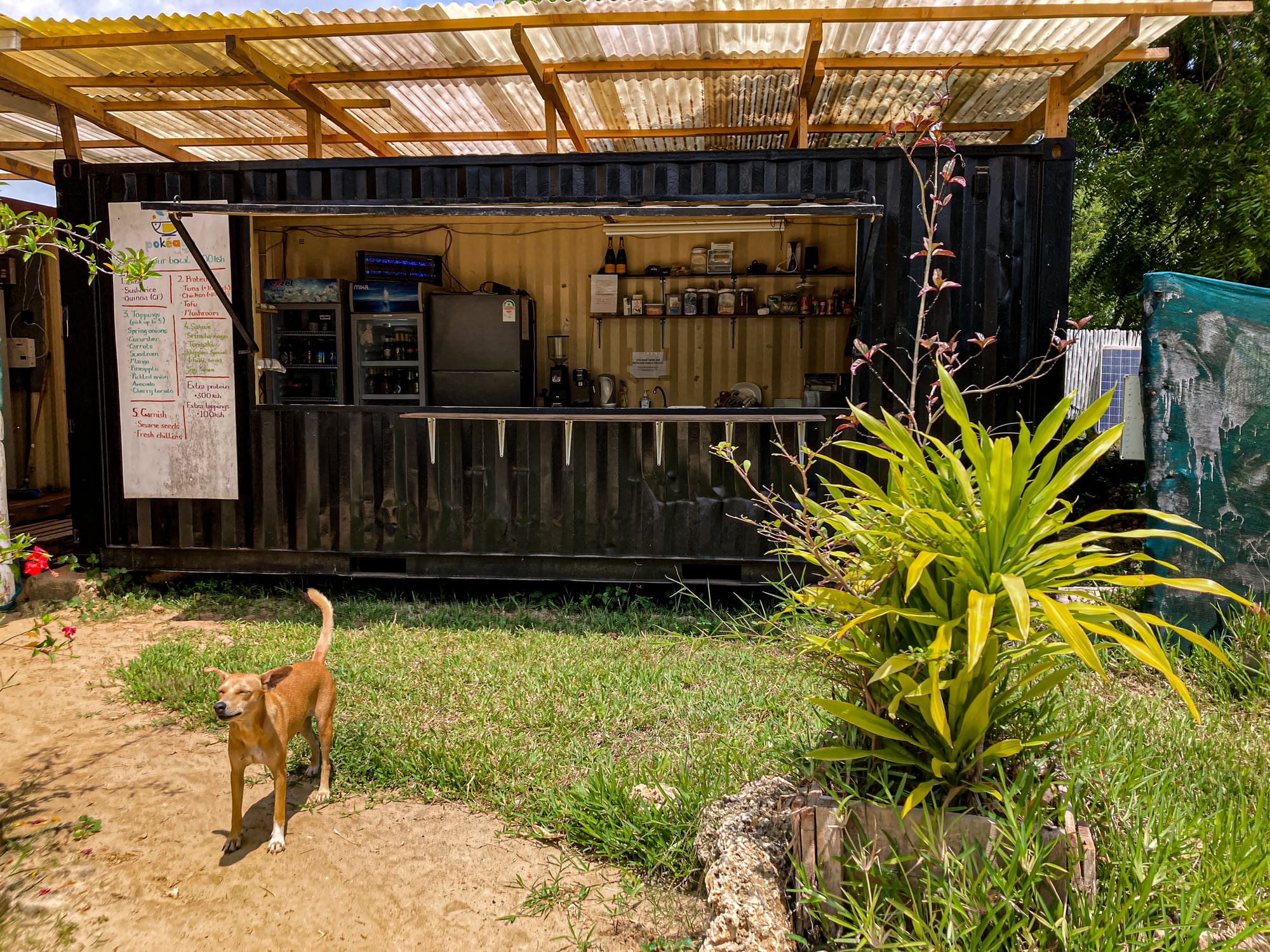
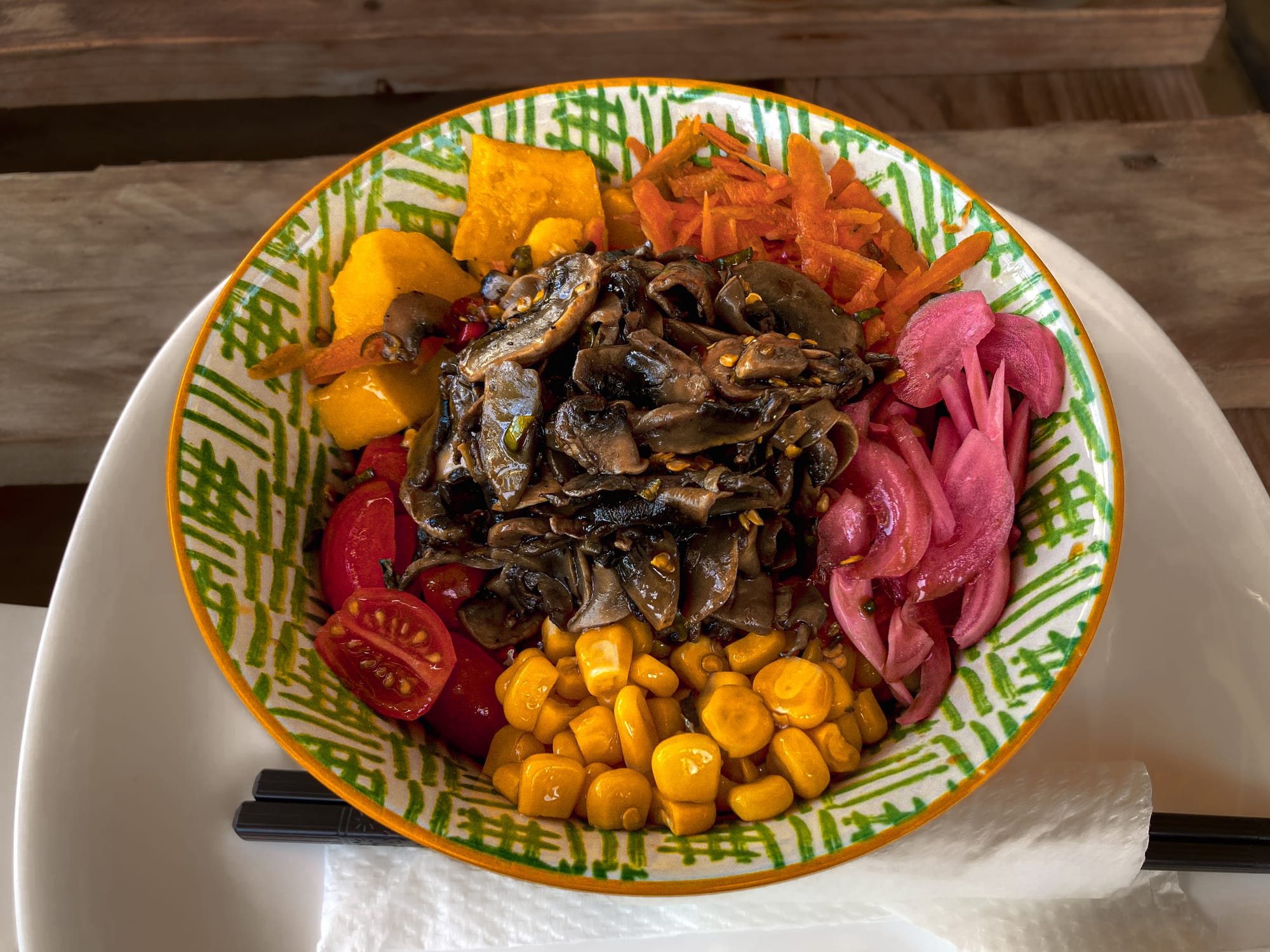
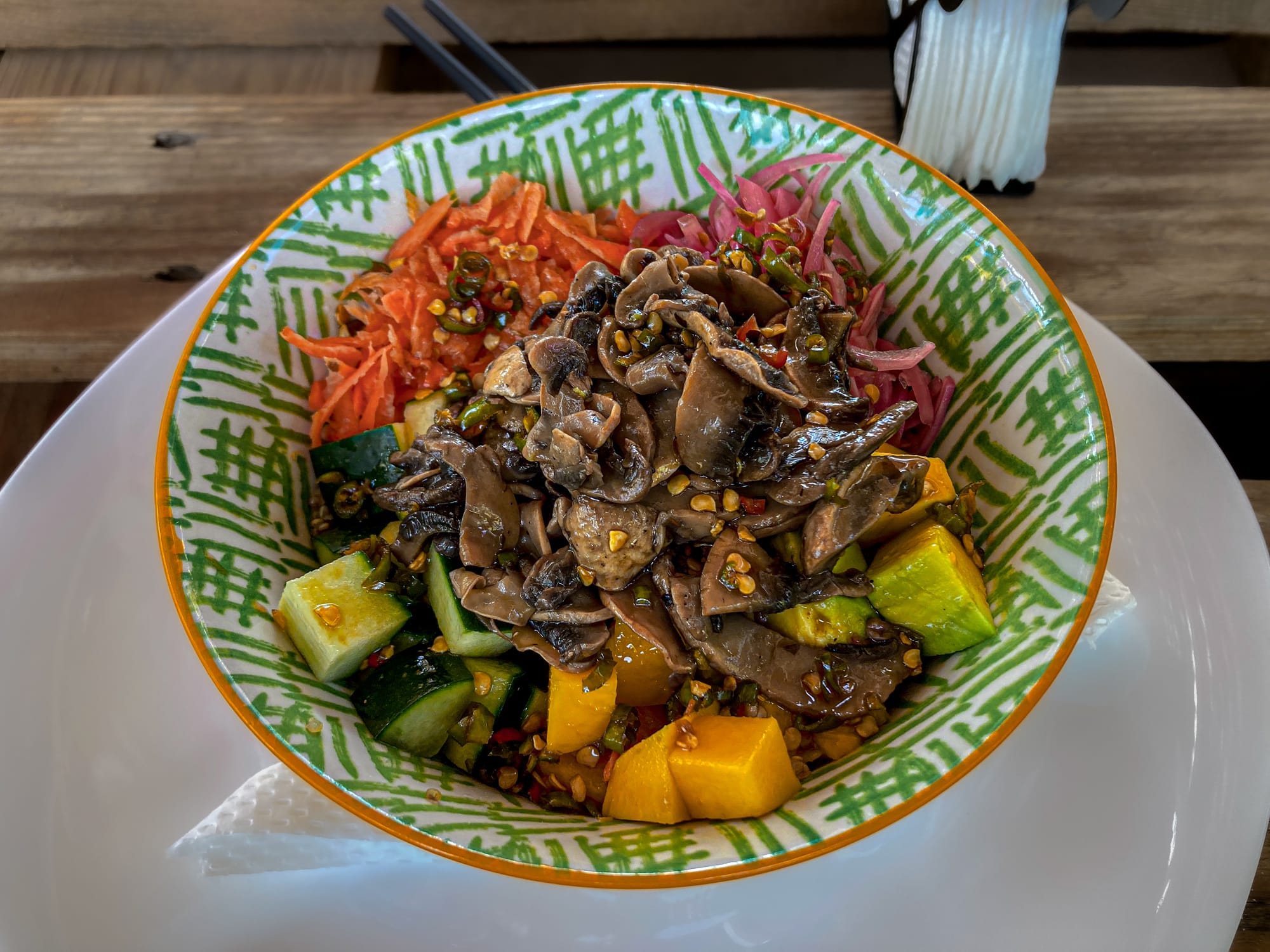
House of Woodfired, the onsite restaurant at Skippers Coliving, serves some of the best pizza in Diani alongside fresh poke bowls
There is also a small pool, a compact gym, and shaded communal areas furnished with upcycled pallets and patterned cushions.
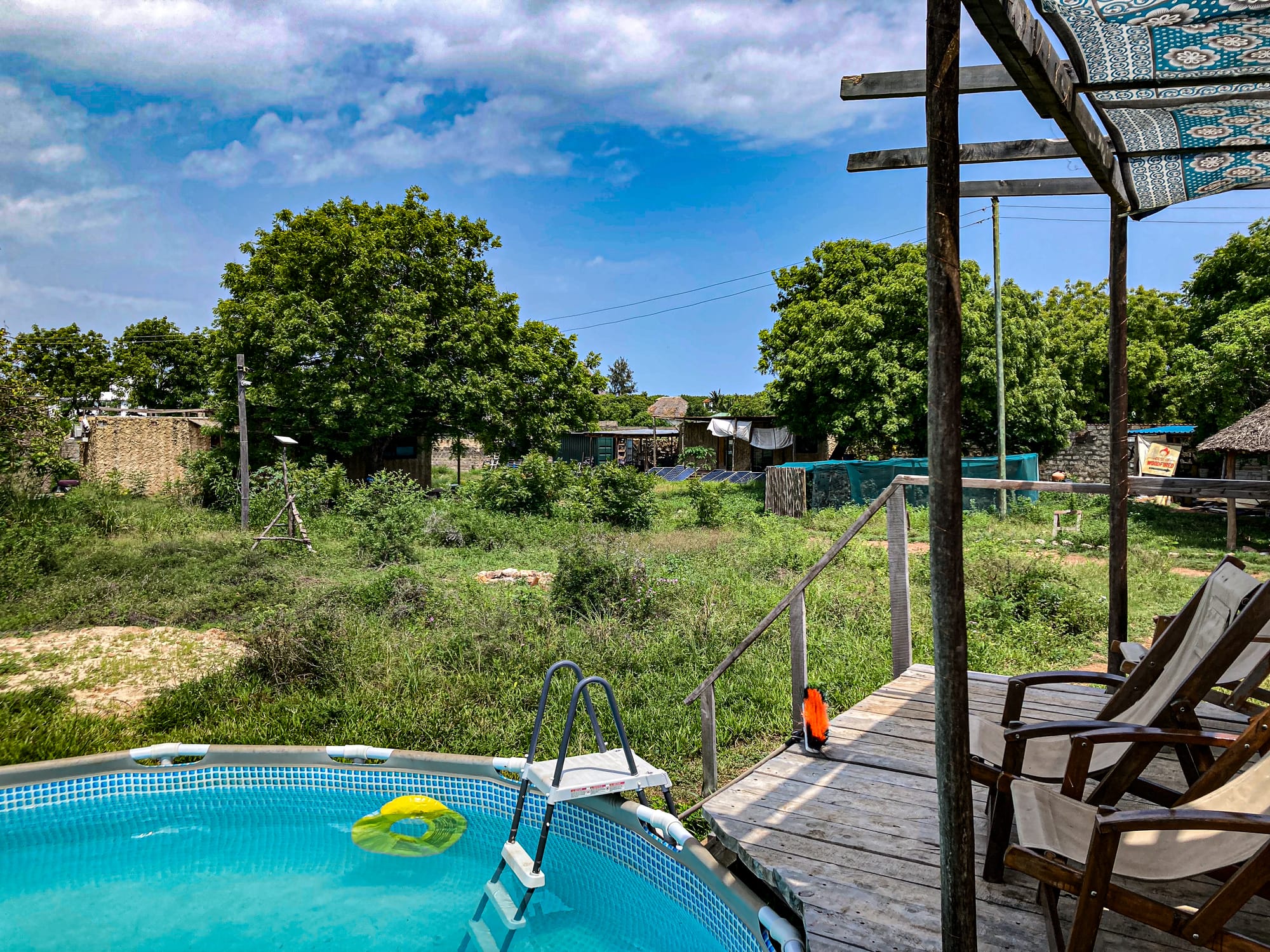
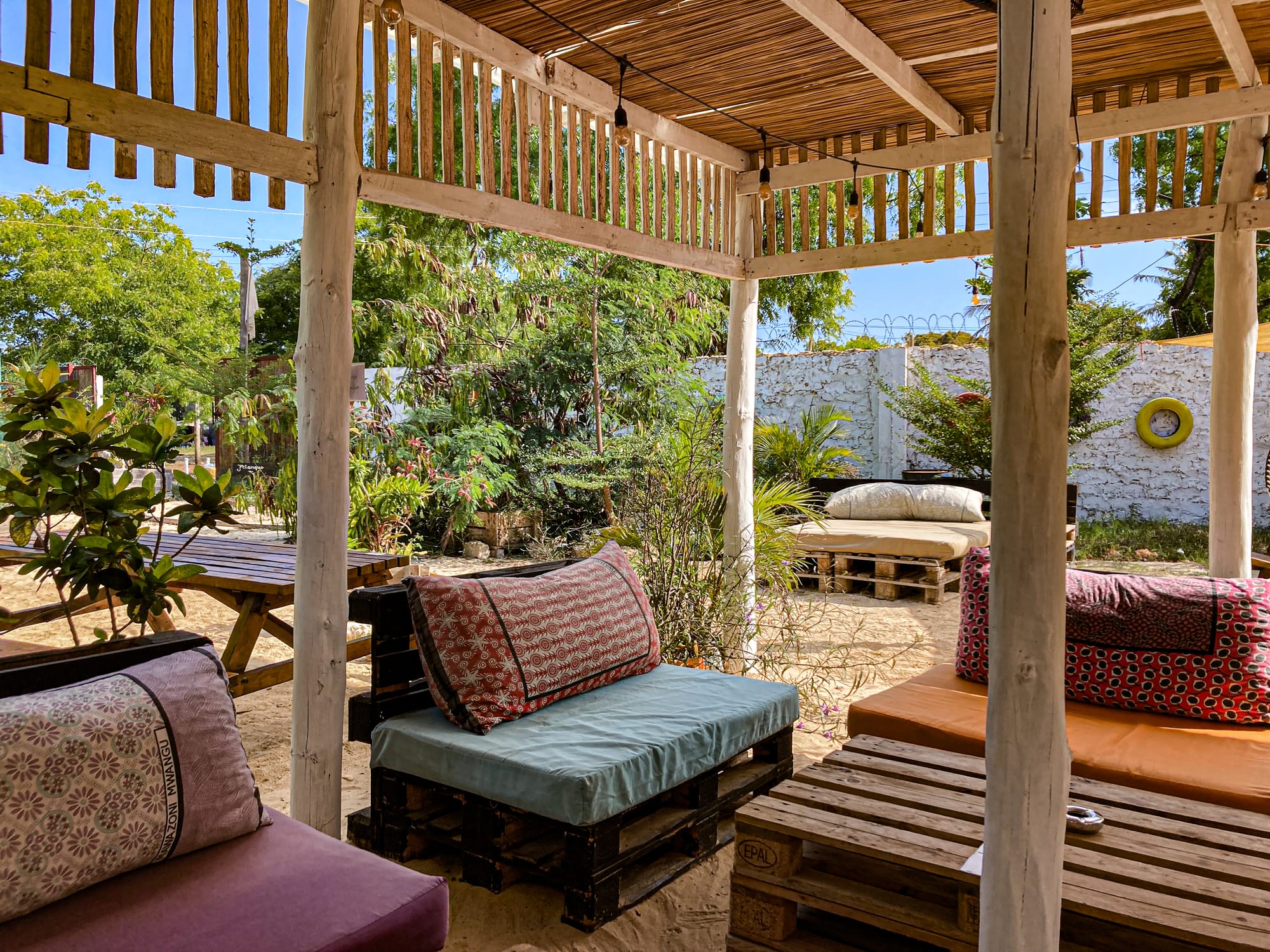
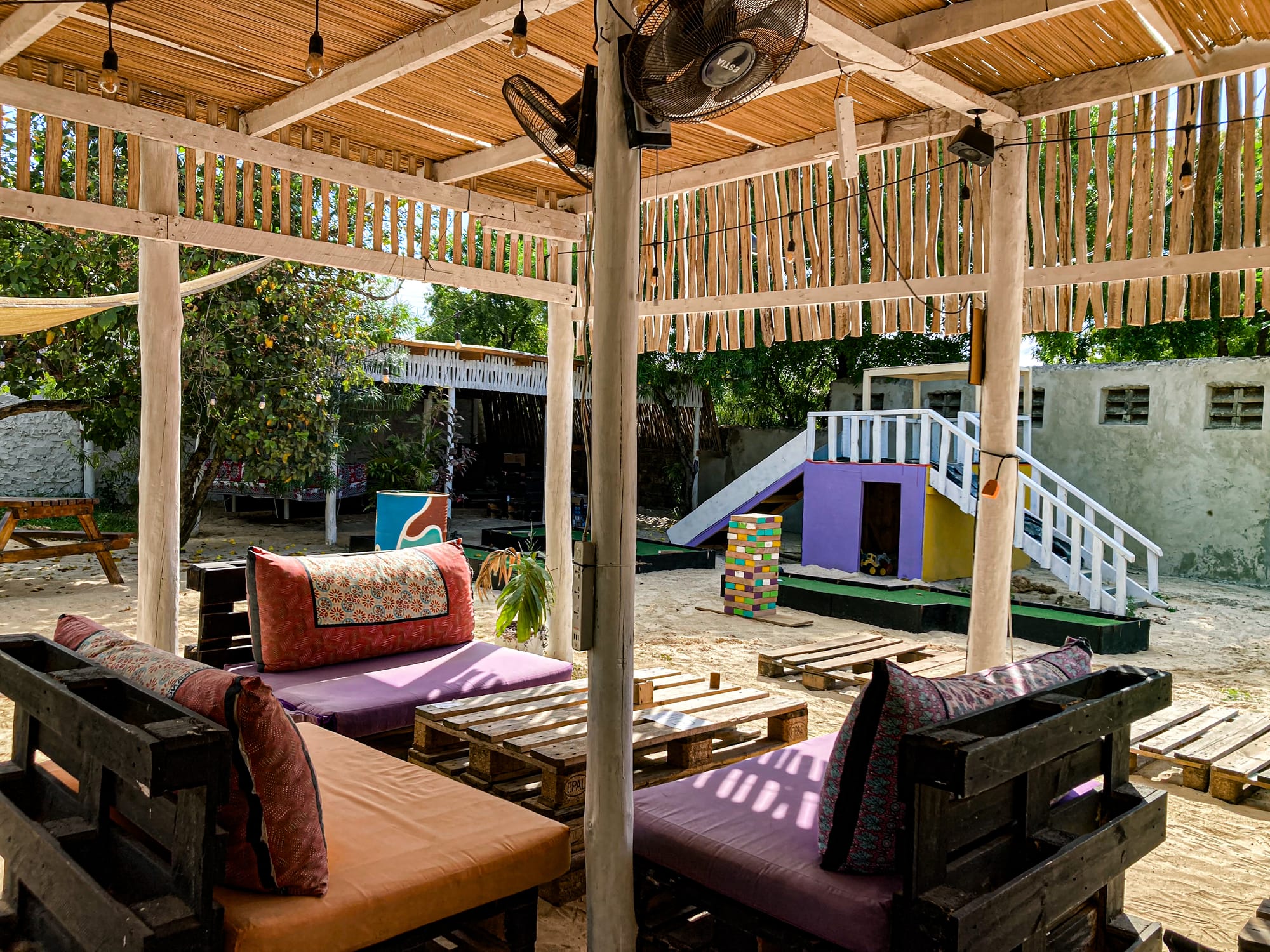
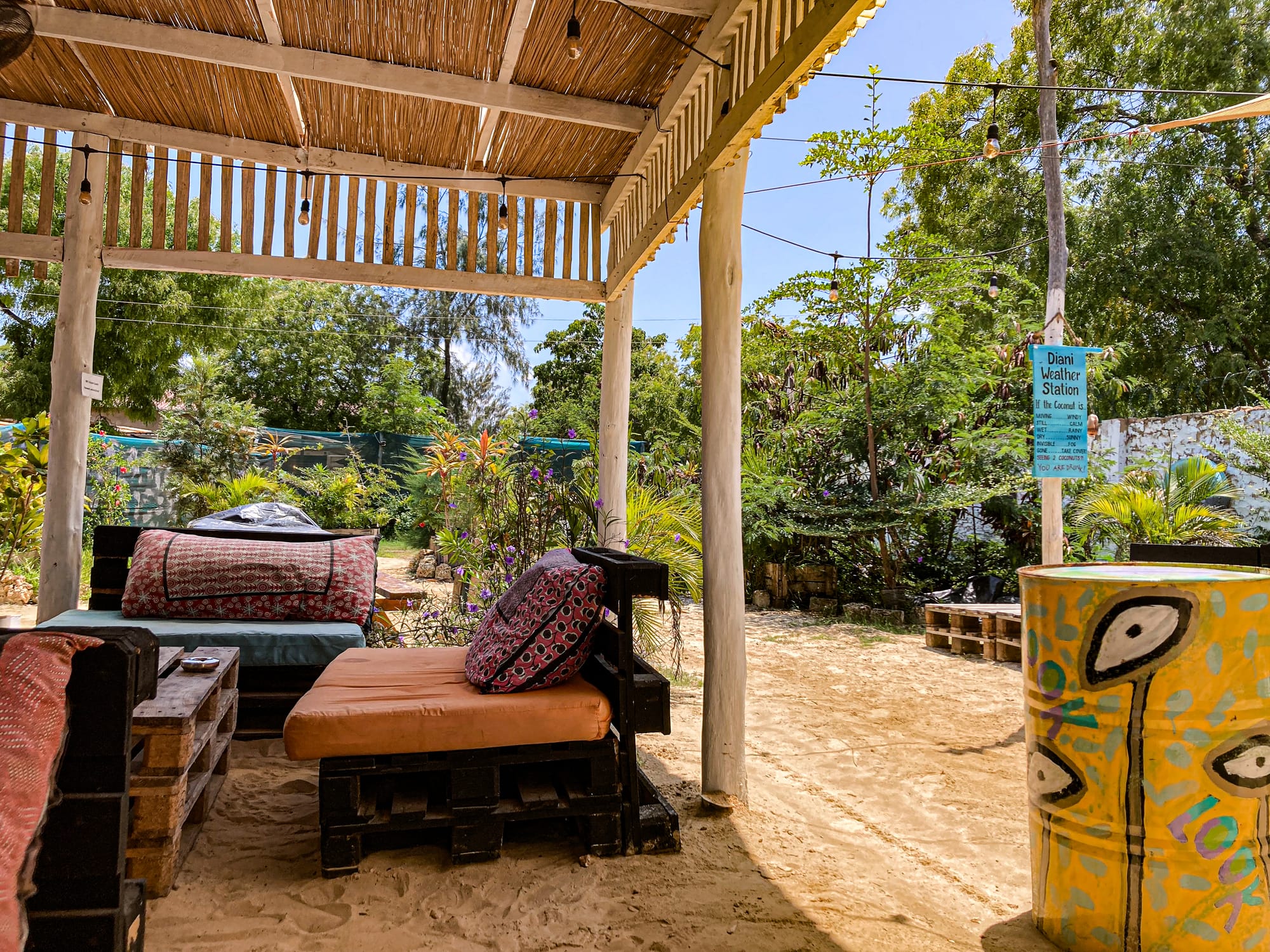
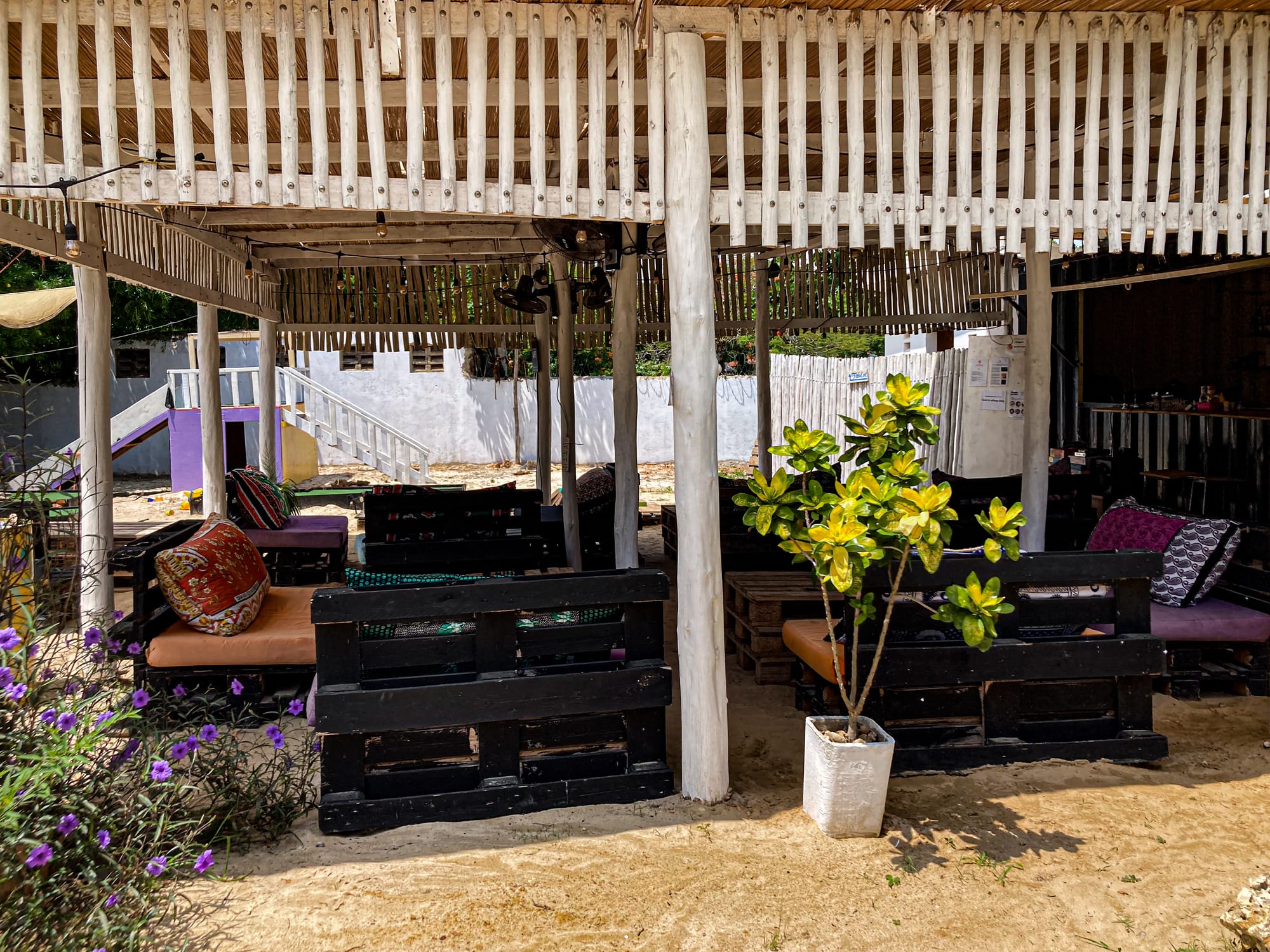
A small pool for cooling off between work sessions and shaded lounge areas made from upcycled pallets
These are not luxury add-ons but invitations: swim when you need to clear your head, lift a few weights before opening your laptop, lounge with others in the heat of the afternoon. Each element is designed to create flow, to make long stays not just possible but pleasurable.
Community life
More than anything, Skippers thrives because of its community. Nights around the bonfire become moments of connection: colivers swap stories under the Kenyan sky, trading notes on safaris, kite-surfing sessions, or work problems.
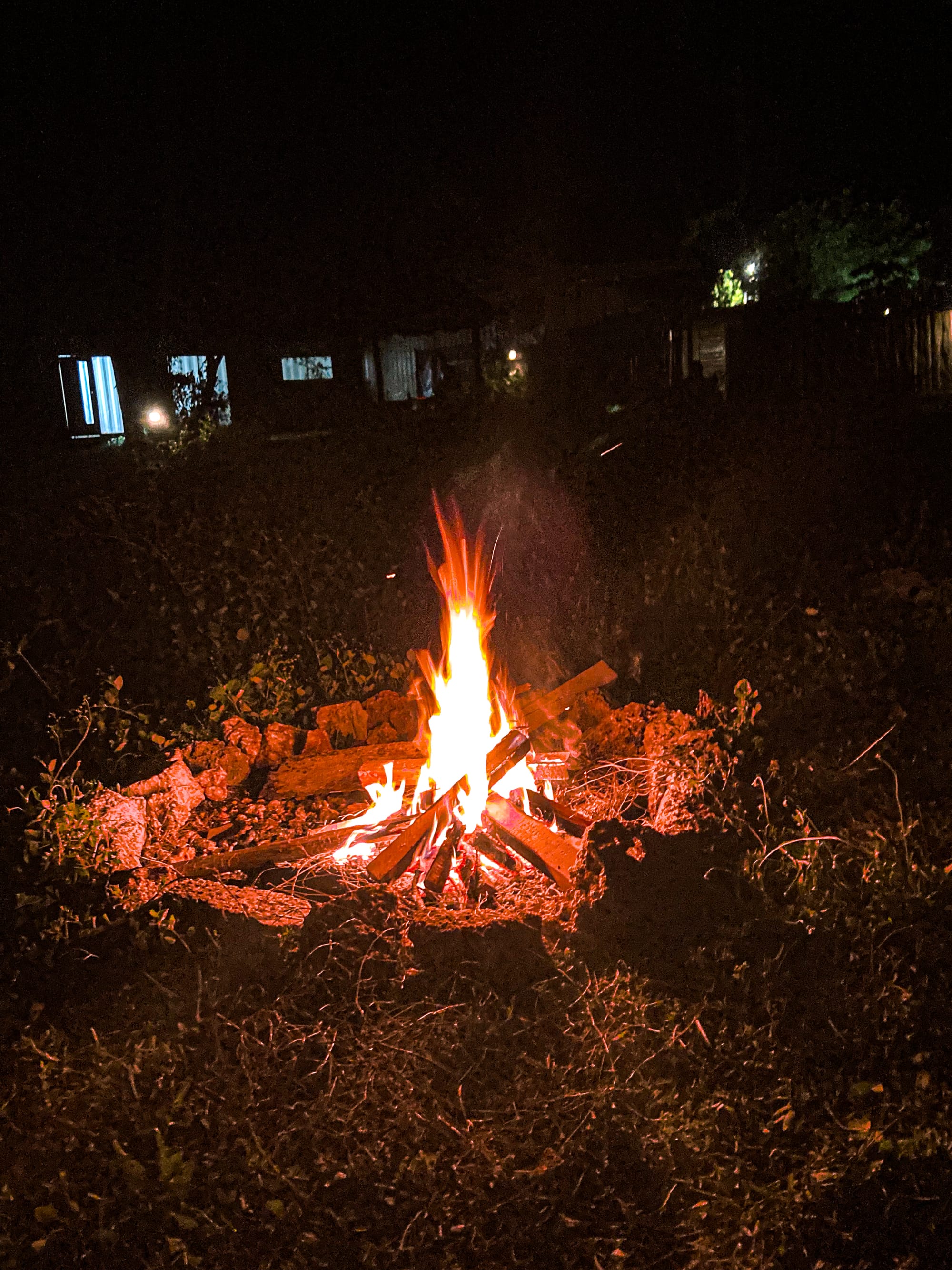
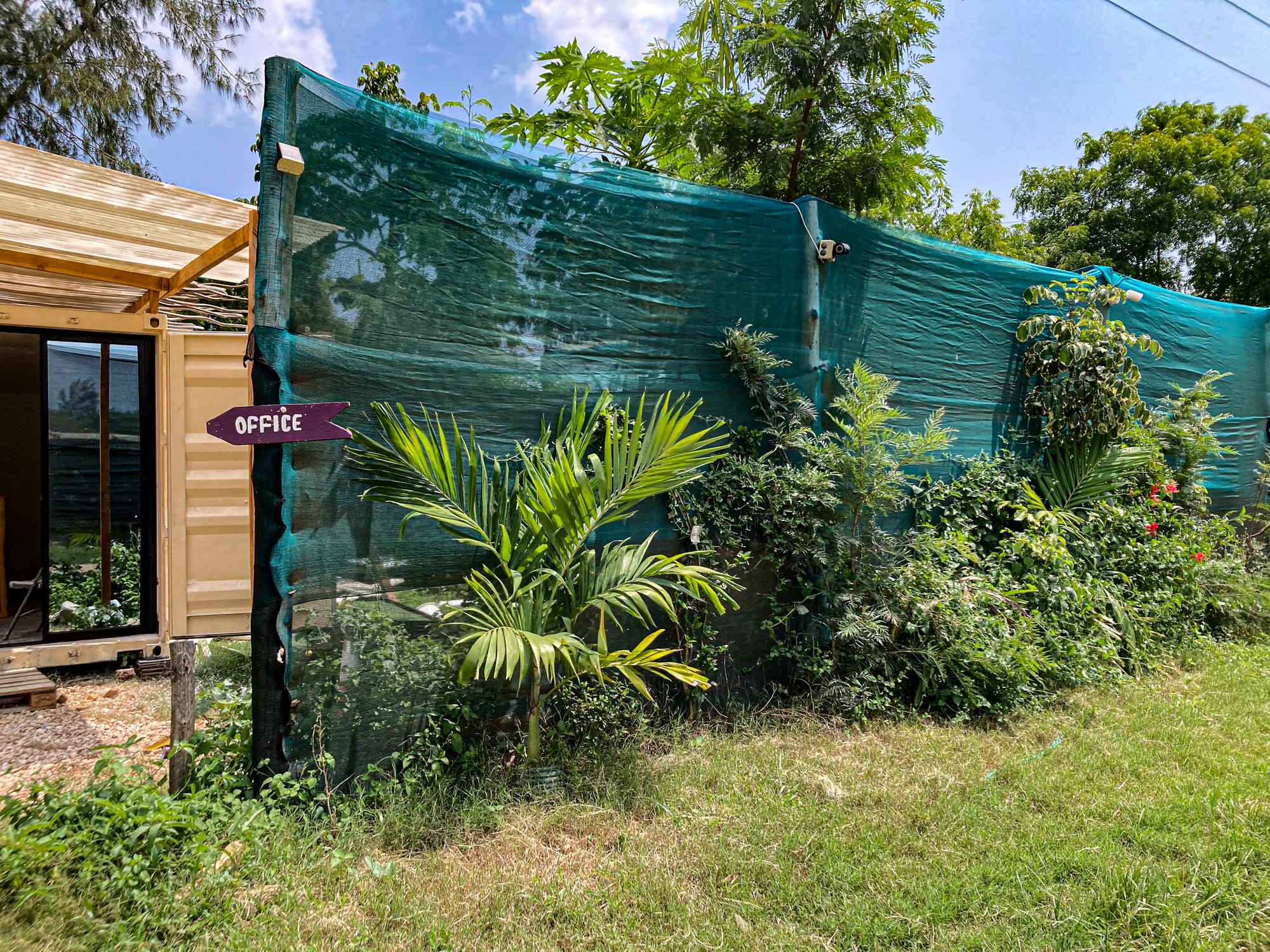
Community is at the heart of Skippers Coliving
The coworking space hums with quiet focus during the day, but the energy of the fire lingers, infusing even the most solitary tasks with a sense of shared purpose.
Skippers also helps to organize events such as trips to Wasini Island or Shimba Hills, for example. If you have anything you'd like to do in the area, you can simply suggest in in their WhatsApp group, and you'll likely get both some suggestions and some other colivers interested in joining.
What Skippers has achieved is rare: it has turned Diani Beach into a destination not just for leisure, but for living as a remote worker. In doing so, it has introduced countless digital nomads to Kenya, many of whom might never have considered it. Reliable wifi, backup power, and intentional community have lowered the barriers to entry, making it possible to imagine Kenya not just as a place to visit, but as a place to stay and to work. We ourselves can say that without these assurances, the Kenyan coast would have been impossible for us to visit.
Location and local vibe
Skippers’ location is as unusual as it is convenient. It sits directly beside the local Ukunda Airport. Guests can disembark a plane and walk to their rooms within minutes. The presence of the airport is both practical and symbolic. It underscores the project’s connection to movement and mobility. Planes come and go; so do guests. Skippers remains a point of anchoring in between.
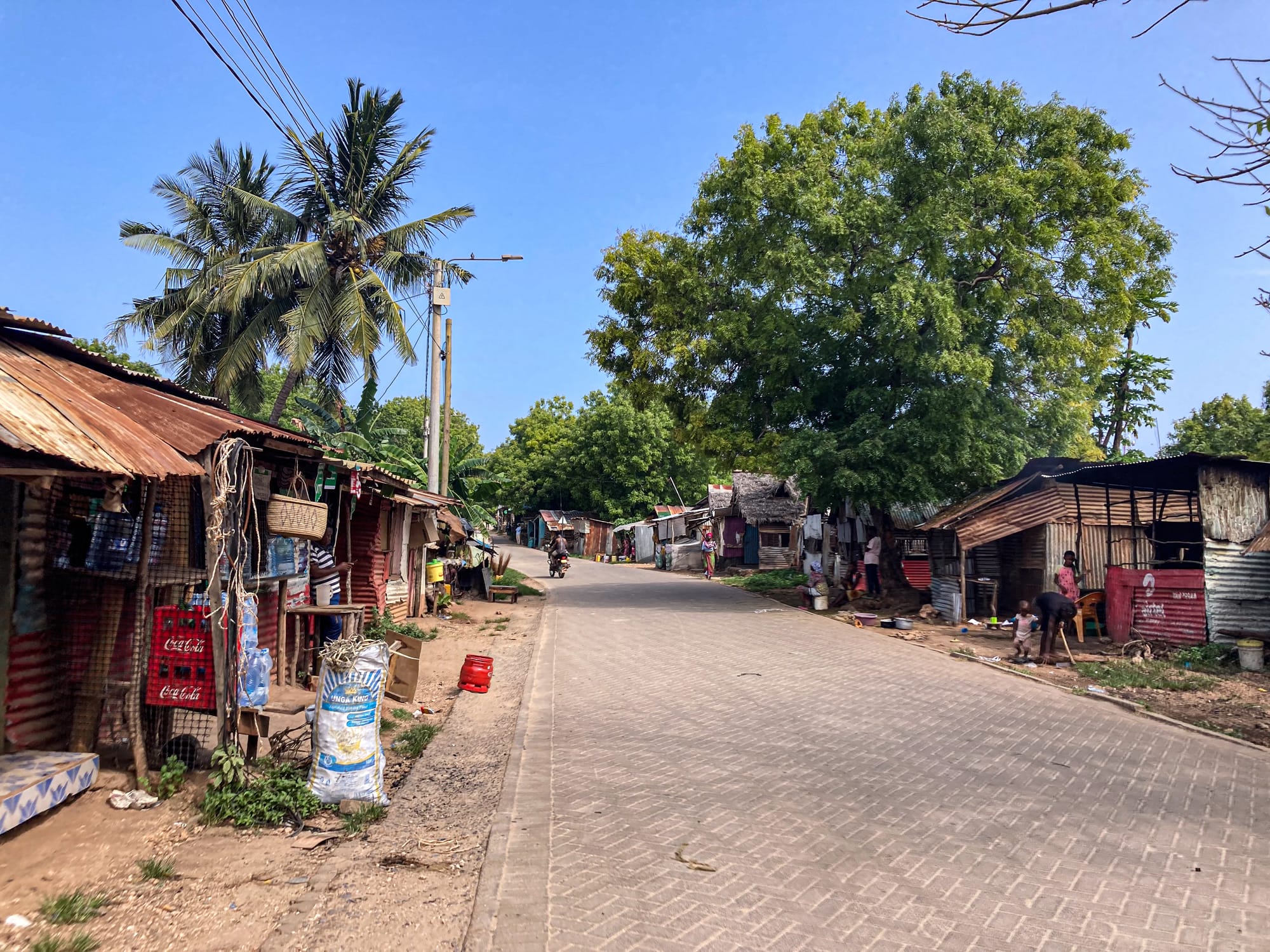
Yet the airport is not the defining feature of its surroundings. Just outside the gates lies a street alive with everyday Kenya. Fruit vendors hang bananas in bunches. Small kiosks sell daily necessities. Neighbors ride bicycles with baskets of greens balanced on the back. It is not the manicured frontage of a resort strip. It is real, unfiltered Kenya. For many travelers, this authenticity is part of the draw. To step outside is to step directly into the fabric of local life.
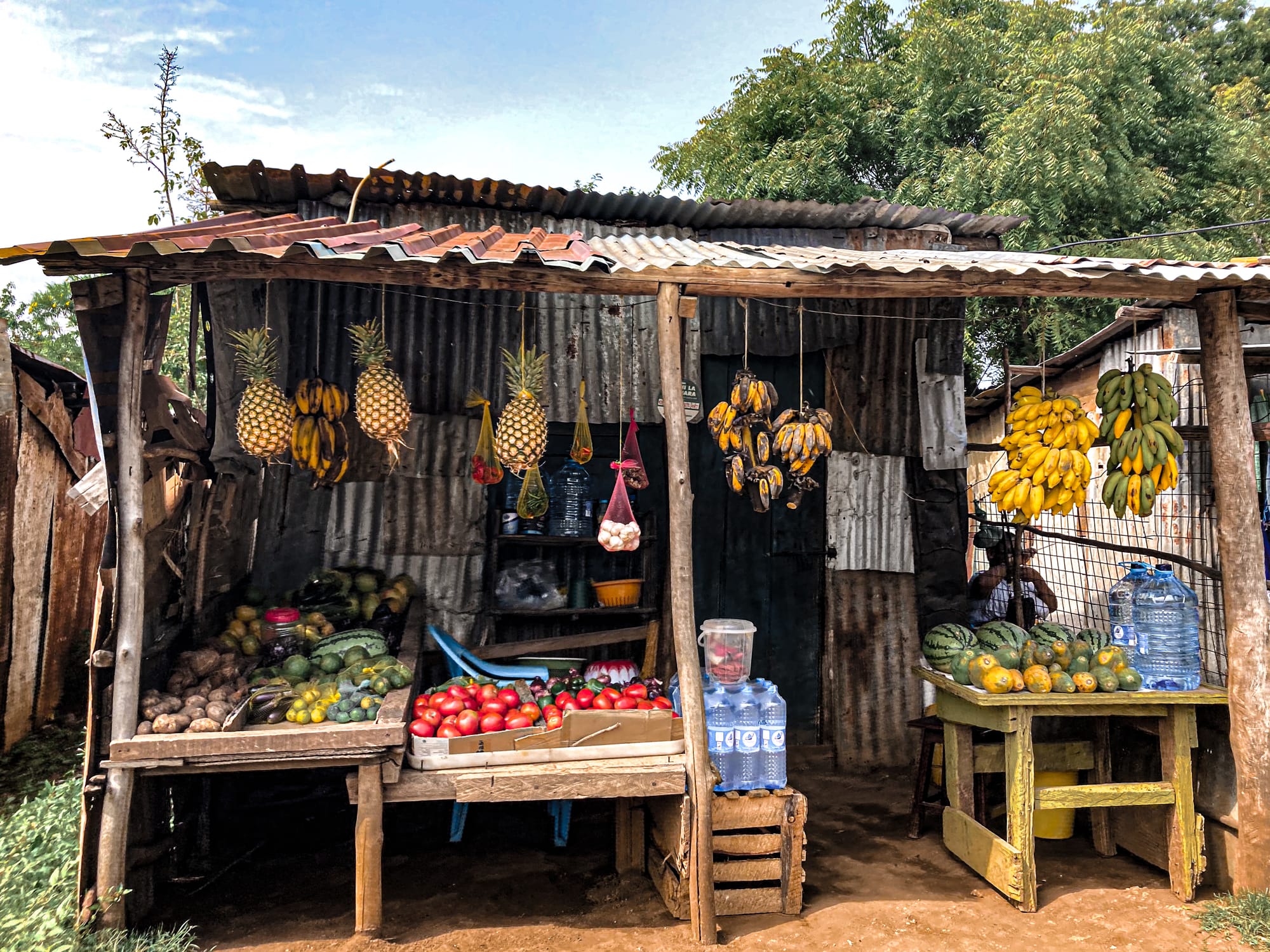
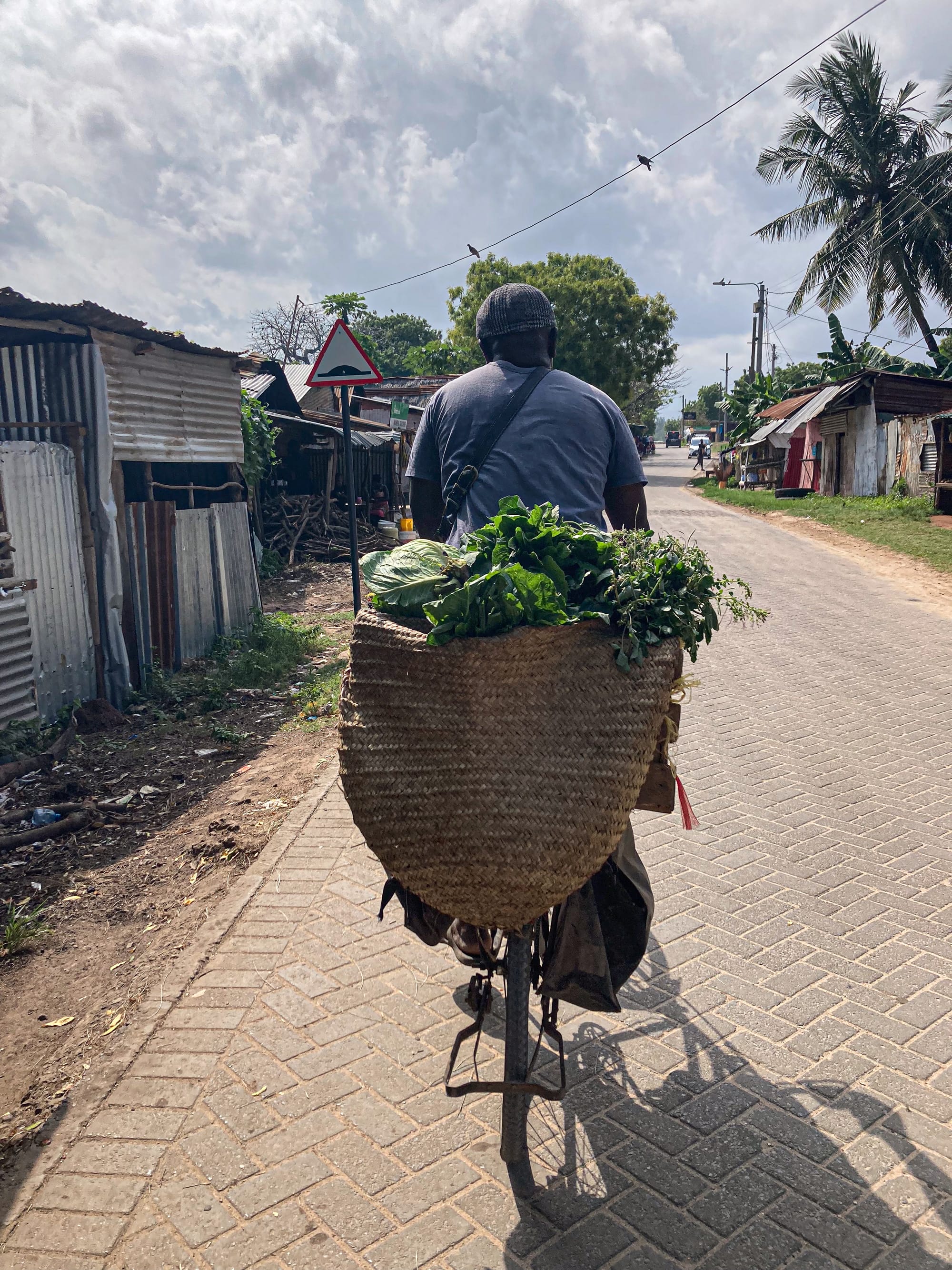
Just outside Skippers, the street is lined with local life
This integration is intentional. Skippers employs local Kenyans as staff, embedding the project within the community rather than above it. The effect is a kind of porousness: the boundary between international guests and local context is thinner here than at the gated resorts up the road. Guests find themselves not only observing, but participating—whether through daily interactions, attending local markets, or joining conversations about life and work in Kenya.
The coliving that put Kenya on the map
What Duncan and Camilla created with Skippers is more than a coliving space. It is an intervention. In a region where reliable infrastructure for remote work is rare, they built something unique: a place where digital nomads can thrive, where the friction of connectivity and power is removed, and where the focus can return to what matters—the work, the people, the experience.
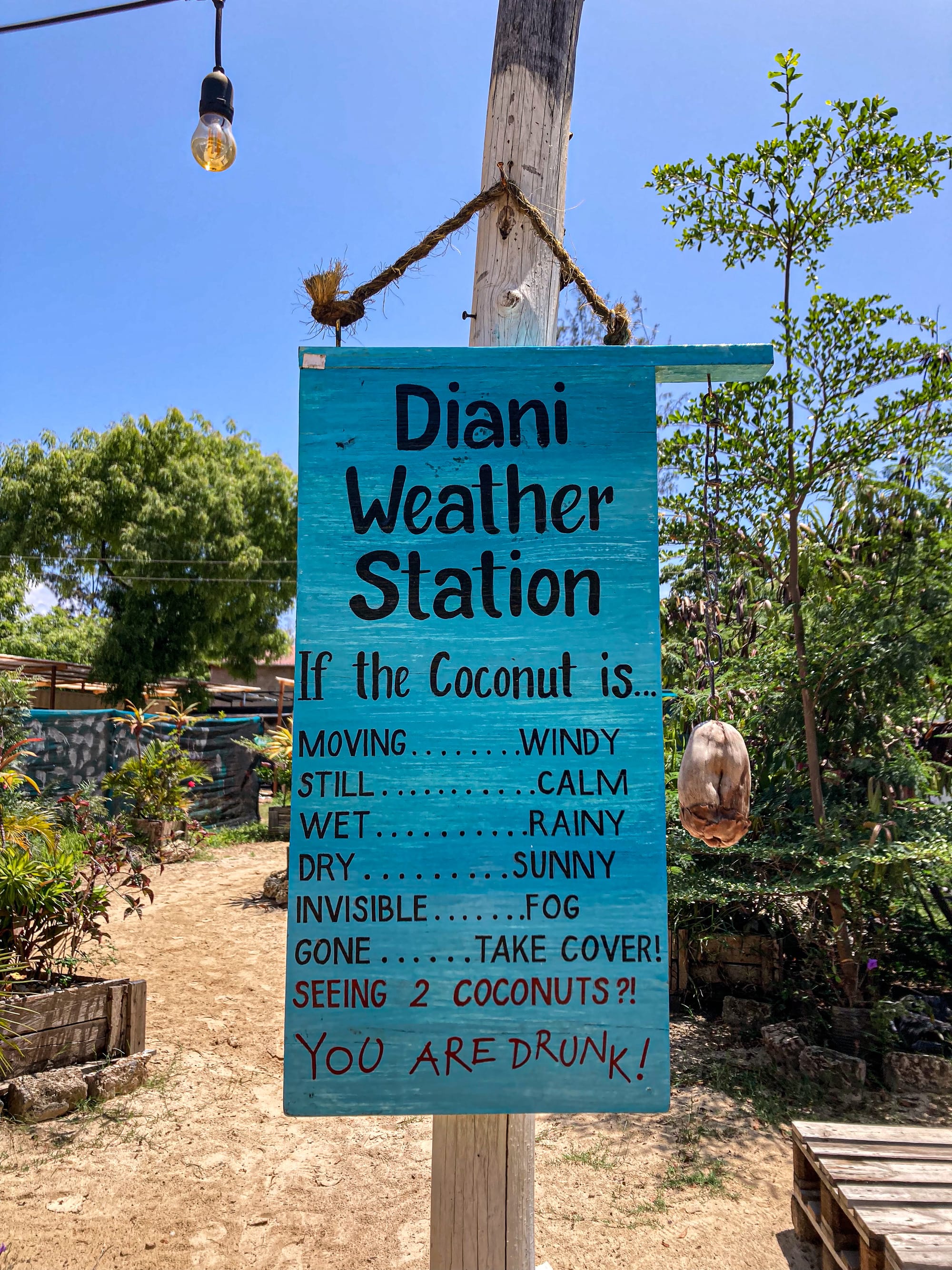
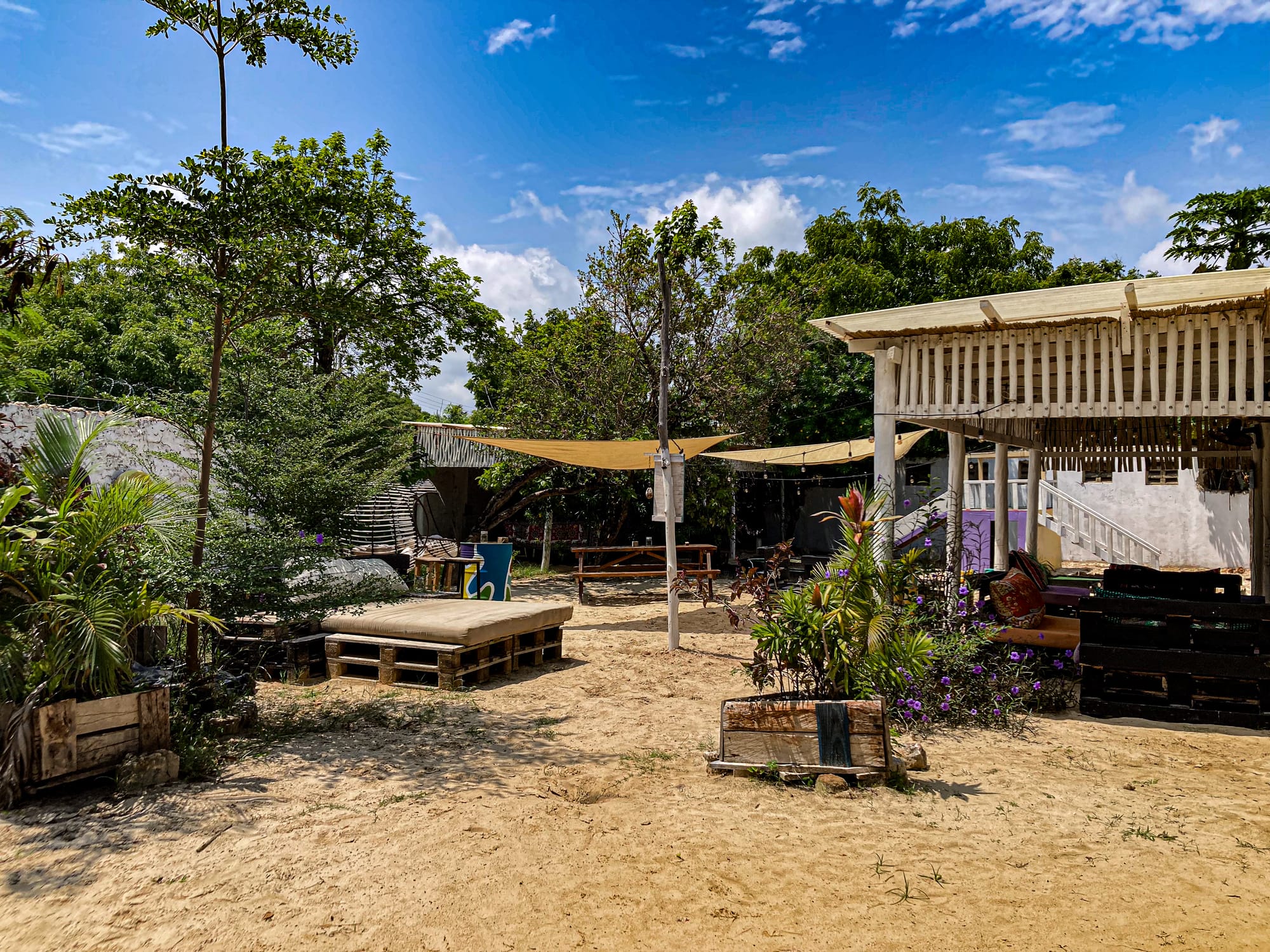
A playful sign greets guests with humor, while the sandy communal courtyard is a favorite place to gather and relax
Camilla’s Kenyan background gave the project depth and connection, but it is their shared history as nomadic sailors that gave it shape. They knew from experience that community is not accidental. It has to be designed, nurtured, and continually renewed. At Skippers, this is evident in every detail: the bonfires, the meal plans, the reliable wifi, the pizza oven, the gym, the shaded lounges. Each is a piece of the infrastructure not just of a place, but of a way of life.
Because of Skippers, more people have discovered Diani, and by extension, Kenya. Remote workers who might never have considered East Africa now have a base that makes it possible. The ripple effects are significant. Guests spend money locally, contribute ideas and skills, and carry stories of Diani into their networks. Kenya is no longer invisible on the map of global remote work. Skippers has placed it firmly within view.






